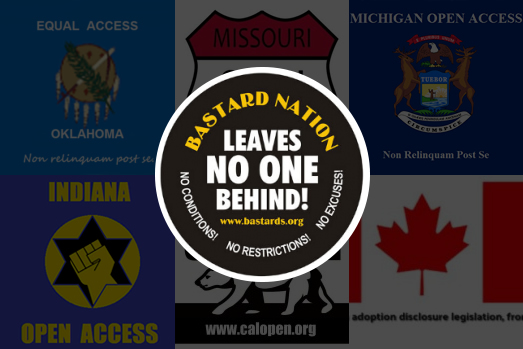IX. Do Birth Parents Have A Right to Privacy?
One of the main concerns raised by those who oppose opening records to adult adoptees is that doing so violates their birth parents’ right to privacy. Open records proponents have long argued that there is no right to privacy that extends to birth parent anonymity, and on February 11, 1997, the Sixth Circuit Court of Appeals handed down a decision confirming this view. [106 F.3d 703 (6th Cir. 1997)]
 In 1996 the Tennessee legislature passed a law granting certain adult adoptees access to their original birth certificates, subject to contact vetoes and significant exception clauses. The law was halted by a court injunction when a group of birth mothers, adoptive parents and an adoption agency filed suit claiming the law violated their constitutional rights under both the Tennessee and Federal Constitution. The federal case ended in 1998 when the United States Supreme Court declined to overrule the Appeals Court ruling in favor of the defendants and open records. The courts rejected the plaintiffs’ claim that their right to privacy was infringed upon, stating, “A birth is simultaneously an intimate occasion and a public event — the government has long kept records of when, where, and by whom babies are born. Such records have myriad purposes, such as furthering the interest of children in knowing the circumstances of their birth.” The judges of the Sixth Circuit Court further found that “if there is a federal constitutional right of familial privacy, it does not extend as far as the plaintiffs would like.” The court also cited a 1981 decision in which the appeals court found that “the Constitution does not encompass a general right to nondisclosure of private information.” More directly, the Court found that the interest of an adoptee to know who his or her birth parents are is “an interest entitled to a good deal of respect and sympathy.”
In 1996 the Tennessee legislature passed a law granting certain adult adoptees access to their original birth certificates, subject to contact vetoes and significant exception clauses. The law was halted by a court injunction when a group of birth mothers, adoptive parents and an adoption agency filed suit claiming the law violated their constitutional rights under both the Tennessee and Federal Constitution. The federal case ended in 1998 when the United States Supreme Court declined to overrule the Appeals Court ruling in favor of the defendants and open records. The courts rejected the plaintiffs’ claim that their right to privacy was infringed upon, stating, “A birth is simultaneously an intimate occasion and a public event — the government has long kept records of when, where, and by whom babies are born. Such records have myriad purposes, such as furthering the interest of children in knowing the circumstances of their birth.” The judges of the Sixth Circuit Court further found that “if there is a federal constitutional right of familial privacy, it does not extend as far as the plaintiffs would like.” The court also cited a 1981 decision in which the appeals court found that “the Constitution does not encompass a general right to nondisclosure of private information.” More directly, the Court found that the interest of an adoptee to know who his or her birth parents are is “an interest entitled to a good deal of respect and sympathy.”
The right to privacy, an implicit right that is not found specifically within the United States Constitution, requires case law to flesh it out and define it further. Our nation’s courts have spoken clearly that the right to privacy does not extend to withholding birth information from the very person to whom it primarily pertains — the adoptee.
Birth parents could have had no reasonable expectation of anonymity. The original birth certificate is sealed when the adoption is finalized in court, not when the birth mother signs relinquishment papers. A child relinquished but never adopted has an unsealed birth certificate. If protection of the birth mother were intended, the original birth certificate would be sealed upon termination of her legal relationship to the child, not at the beginning of the legal relationship of the adoptive family. Nearly all states have provisions for opening adoption or birth records for good cause without the consent or even notification of the birth parent. Birth mothers signed irrevocable relinquishment forms, but there have been no contracts produced promising that an adoptee’s original birth record would remain sealed.
Despite the finding that birth parent privacy rights do not extend as far as keeping their names secret from adoptees, opponents of open records have continued to claim that some birth parents, particularly women, would be harmed emotionally if they were to be contacted by a relinquished child who had reached the age of majority. In addition, some reproductive rights advocates believe that permanently sealed birth records should be an option for pregnant women who choose not to raise a child.
In reality their adult children, raised by others, are not the enemies of birth parents. Our laws and policies should not deprive one group of their rights in order to protect others from possibly having to face the consequences of their past choices. In the event that an adoptee chooses to contact a birth parent, both people should consider the feelings and concerns of the other. When birth records are opened to adult adoptees, a woman who relinquishes an infant will have eighteen to twenty-one years to decide how to answer a possible phone call from that adult child. Even today, with records still sealed in most states in the United States, birth parents must consider their responses to being found, since a network of search consultants has arisen to circumvent sealed records. Most birth parents are happy to be contacted by their adult children. A right to privacy that prevents the disclosure of birth parents’ names to adult adoptees does not exist in law or in the real world.




